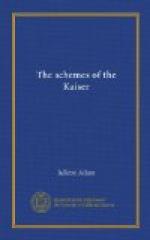For the past year we have repeatedly been told, in more or less sensational revelations, that the influence which chiefly determined Nicholas II in his action, was his reading of a famous book on war by M. de Bloch. This is no doubt true and the fact may be admitted. Much moved by the eloquent description, given by the great financial writer of Warsaw, of the heavy burdens imposed on the nations by the extravagant armaments of the Continent, and terrified at the thought of the calamities which the next war would let loose upon all Europe, Nicholas II, full of Christian pity for the sufferings of humanity, directed Count Mouravieff to send the famous circular to the Powers, which resulted in the convening of the Hague Conference.
But I would ask, how are we to reconcile the hostile attitude of William II’s delegates to the Russian proposals with his solemn declaration that he was absolutely in agreement with his friend Nicholas II? Why did the German Emperor first give his approval to De Bloch’s campaign in favour of disarmament and then make Von Schwartzkopf publicly repudiate the most important arguments of that writer’s book? Was it that William II was in the first instance seduced by the lamentable picture which De Bloch gives of France and the organisation of her army, or (and this seems far more likely) did he simply approve of the intrigue set on foot by the author of this work on war, an intrigue which aimed at casting a shadow over the patriotic hopes that France placed on the Russian alliance, by inciting Nicholas II to call for a general disarmament?
It must be confessed that the Franco-Russian alliance struck a bitter blow at the hopes of Polish patriots. The contempt and hostility towards France which inspire M. de Bloch’s book are proof sufficient of the grudge its author bears us. It is perfectly evident that they must have been delighted in Berlin at the chief object of his work. But there were other objects in view.
For years William II has unceasingly laboured to persuade England that she has every interest to join the Triple Alliance. His perseverance in this direction is quite natural. But if Germany succeeded last year in concluding an agreement with England on a few special questions, the Hague Conference has proved that it does not involve an agreement in matters of general policy.
Nevertheless, William II counted on this Congress to produce closer relations with Great Britain. He hoped that the Congress would result in sharp antagonism between England and Russia and he reckoned on this antagonism to help him to inflict a severe defeat on Russia, which in its turn would have enabled him to draw one or other of these two Powers into the orbit of his policy. Great then was the disappointment of the German Emperor when, from the very outset of the Conference, England, performing a most unexpected volte-face, made proposals on the subject of arbitration, which went a great deal farther than the Russian proposals laid before, the Congress. This master-stroke of British diplomacy compelled Germany to come out into the open and to reveal herself in her true light: that is to say, as the only obstacle to the fulfilment of the Tzar’s humanitarian designs.




